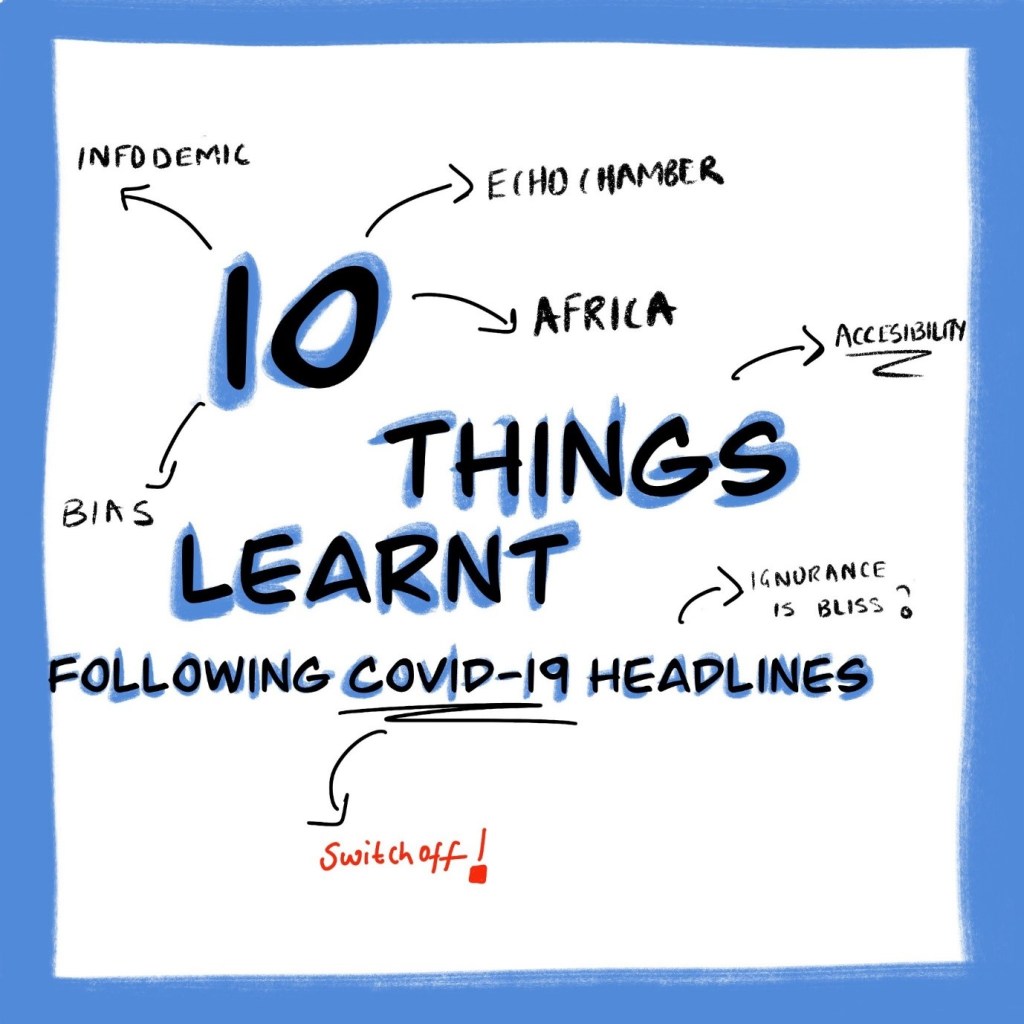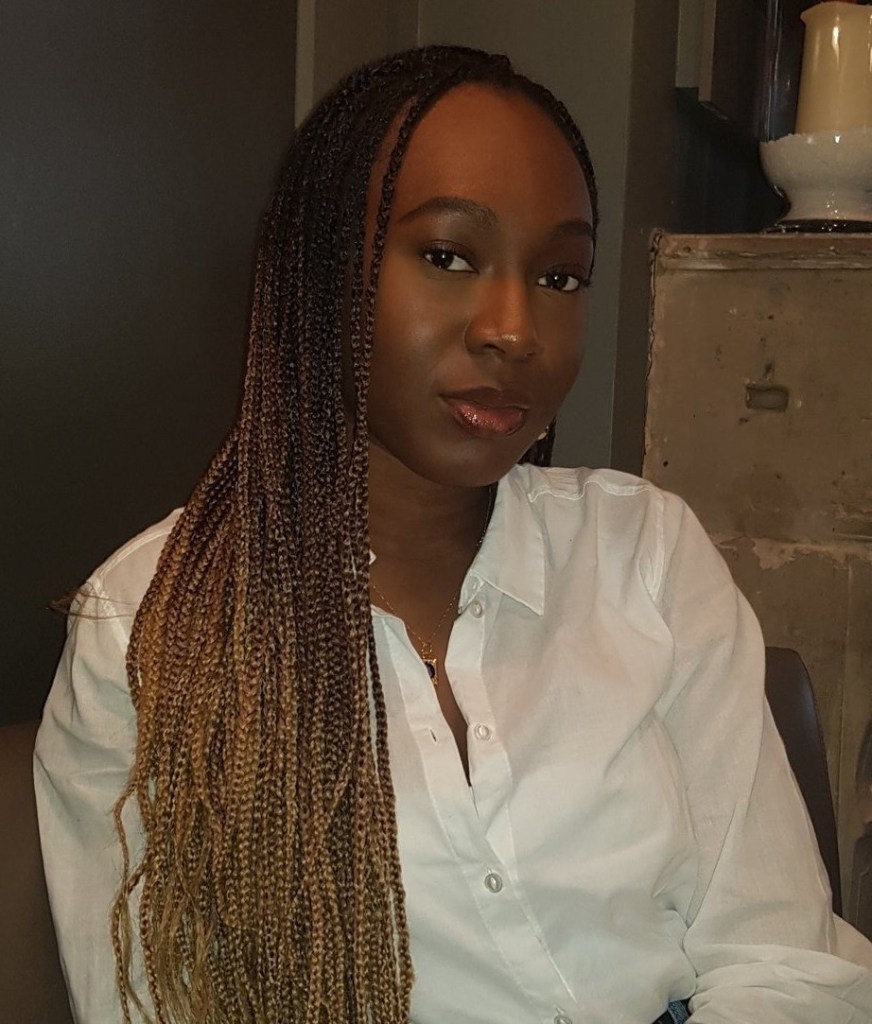By Adama Saccoh, The Catalyst in Me
Fancy Comma, LLC is honored to feature this post by science communicator Adama Saccoh. She is founder of The Catalyst In Me, a website geared toward young professionals interested in science. Read on to learn about the lessons Adama learned from her experience navigating COVID-19 headlines.

At the start of the COVID-19 pandemic, my university work came to an abrupt pause. So I did the next best thing — I used the knowledge I gained from my undergrad to read about COVID-19. From there, I casually decided to follow news headlines and articles about what was going on. This started as nothing more than curiosity and something to do while I waited for school to resume. Several months in, and many news articles later, I found myself becoming a self-styled COVID-19 reporter.
In the past 10 months, I have written many twitter threads and instagram posts, and held a survey and started a web page on public perception of science — all great personal development things. Through all of this, I have also learnt a few important lessons. Here are 10 things reporting the COVID-19 pandemic brought to my attention.
1. Misinformation is a HUGE problem for the next decade.
Misinformation, fake news, false news…whatever you want to call it…spreads like wildfire! The World Health Organization discussed the COVID-19 “infodemic” and the need to tackle misinformation very early on in the pandemic. These guides, however great, focused only on communities where language or culture was seen as a barrier to accurate information. However, in reporting on COVID-19 myself, I noticed a worrisome problem. The younger generation are perceived to have more access to information and be more aware of how misleading social media can be, but they often fell for fake news. Clickbait — internet articles meant solely to drive pageviews — can go viral, even if it contains wrong information.
“I have seen popular YouTubers happily spread false news — and with young audiences that are unlikely to fact-check, it spreads even faster!” – @CatalystInMe_
Tweet
Why does misinformation spread so quickly on the web? Well, we have a problem where everyone is given a platform, and the “popular” person is allowed to spread misinformation and rarely be checked! I have seen popular YouTubers happily spread false news — and with young audiences that are unlikely to fact-check, it spreads even faster! With things like this happening, it is only a matter of time before we get worse than our relatives who send chain messages on WhatsApp.
2. Media outlets are focusing on the wrong things.
The way the Western world has handled the pandemic has been shocking. I reside in the UK but was raised in Sierra Leone, so I decided to compare the two nations’ pandemic response. While the UK reporting tended to confuse the nation, Sierra Leone focused on educating its citizens. One health video published in Sierra Leone impressed me a lot. It was a public health messaging cartoon about Ebola and COVID-19 that was made in the local language (Krio). Simple yet accessible.
On the other hand, the UK seemed to skip the basics, and move onto complicated optics and campaign-like strategy, which led to poor public health messaging. If I had left my information consumption solely to media outlets, I would have become overwhelmed, angry, and consumed by clickbait titles.
This brings me to my next point.
3. UK press conferences were not designed for the general public.
If you were lucky — or unlucky, you may say — to have watched a single press conference, you would be overwhelmed by information. The complicated data constantly displayed on national television was akin to what you’d see at a scientific conference. These press conferences did not seem targeted to the average person without a scientific background. Confusing terms mentioned include “R number,” “ herd immunity,” and “flatten the curve” — thrown around at every possible moment without adequate explanation. None of these press conferences left you feeling a sense of clarity, just confusion and disappointment.
The inability for complex COVID-19 briefings to speak to a general audience may have undermined best efforts to combat the pandemic. – @CatalystInMe_
Tweet
Weirdly, all of the resources were at the UK’s disposal to develop more informative, easy-to-understand briefings. That’s why the level of incompleteness led me to question the briefings — what if things were left out or made to be confusing intentionally? Regardless of the intent, the briefings’ inaccessibility to a general audience may have undermined the UK’s best efforts to combat COVID-19.
4. Everything is biased and there is always an agenda.
Earlier in this post, I discussed the spread of misinformation. So-called “fake news” can come from sources which are trying to drive pageviews rather than inform. In reading news sources, the sooner you realize that every piece of online content has an agenda, whether good or bad, the better!
In the case of big media, “clickbait” is the worst of them all. In a pandemic, I strongly believe everything should be clearly spelt out with authoritative sources with little room for misinterpretation. That doesn’t always happen, though.
In consuming COVID-19 content, I found myself referring back to the author’s page, and reviewing a few tweets mainly to see their stance on the pandemic. Understanding an author’s views regarding everything happening with COVID-19 is essential. For example, writers dissatisfied with the government response to COVID-19 will publish articles to that end. I am not saying it is wrong to have a stance, but as a consumer of content, it is important to be aware of what the author is trying to get across, and what biases they may already have.
5. Developed nations are entitled.
Developed nations are more entitled than other nations. I say this with zero caution, but perhaps it should go without saying. Let’s go back to my example of comparing the Sierra Leone and the UK. Individuals in the UK act very entitled. This is why you have, to this day, people denying the fact that wearing a mask protects both yourself and other people.
In Sierra Leone, the problems are different. According to Haja Marie Kondeh, a business leader in Sierra Leone, people in the West African nation “don’t wear masks not because we don’t want to, but because we cannot afford to buy them.” However, as I will talk about next, Africa has not been as affected by COVID-19 to the extent that the Western world has. People in the Western world are used to not being inconvenienced, and for some, the pandemic is the most they have had to do something for someone aside from themselves.
6. Western media has a fascination with Africa failing.
The West can simply not fathom how Africa as a continent can handle the pandemic and not be as badly hit as the rest of the world. There is still much up for debate on the exact reasons why, as the media put it, “Africa was spared,” instead of rightfully highlighting good public health guidance, compliance, and previous outbreak and pandemic experience — to name a few.
Writers choose to pick apart at Africa and paint it negatively, which has led to further misinformation in COVID-19. – @CatalystInMe_
Tweet
Writers choose to pick apart at the continent and paint it negatively. A very recent example is the finding of the new COVID-19 variants. There is a South African variant and a UK variant. Somehow, the UK government officials have made it seem like one is worse than the other. Can you guess which?
According to the BBC, while the South African COVID-19 mutation may cause the disease to be more infectious, there’s currently no evidence that the variant causes more serious symptoms.
It is time for the Western world to step away from the lens of a helpless and failing Africa!
7. People don’t always want to hear the truth — and ignorance is bliss.
After months and months of news headlines and social media postings, there are people that believe ignorance is the way to go. Information on the science of COVID-19 can be difficult to understand, which can make ignoring the news a go-to mechanism, leading to irresponsible behavior under the guise of “I don’t know.” I can partly understand why this happens. It’s easy to try to ignore the world and hope (or even worse, pretend) that COVID-19 is past us.
Sadly, the “ignorance-is-bliss” pathway is how conspiracy theorists start their journey. They solidifying their perfect bubble with false propaganda that suits a narrative. You may find their misinformation on social media or on the web. My advice here is to avoid people that choose to remain ignorant! Arguing with sources of misinformation is often a waste of time that drains your energy. You can’t change the minds of people set in their beliefs, however wrong those beliefs are.
8. Science communication is important right now, but how do we leave the echo chamber?
It’s clear that science communication is more important right now than ever. Science communicators must be able to reach wider and more diverse audiences in the COVID-19 pandemic. However, the problem with online communities is that we tend to form echo chambers. A science communicator may be “preaching to the choir” on their social media channels. In fact, a lot of people don’t know who a science communicator is. Furthermore, those who call themselves a science communicator may define their role or even science communication differently.
Yes, the odd few virologists and doctors may be on the news, explaining the science of COVID-19, but we need a better relationship between media, politics and science. Some will argue that this is where public health professionals come into play. But the same way the UK government paid Instagram influencers to promote the failed Test and Trace app, they could have instead engaged with science communicators of different levels that are already producing amazing and well-informed content!
9. Humor is important: You can’t come and kill yourself (word to Burna Boy).
So, this point is just an honorable mention to Munya Chawawa who kept us all giggling during the pandemic. Funnily enough, you got clearer information from him than government officials. He managed to mix humor with information while voicing the public’s concerns with all the changes and how frustrating the whole situation was. Chawawa’s hilarious Twitter page highlighted another missed opportunity of not using content creators with the range and skill to aid public health messaging!
10. It is important to take a break sometimes.
I can’t say at any point I felt at ease during the COVID-19 pandemic. There have been days in which my information-seeking tendencies really wore me down. I learned that it is okay to switch off and come back a week later. Following the basics of social distancing, mask wearing, and being safe won’t change in a week. For science communicators, it is okay to NOT write that blog post today. There is no need to educate people 24/7. Knowing a lot can really take its toll.
For science communicators, it is okay to NOT write that blog post today. There is no need to educate people 24/7. Knowing a lot can really take its toll. – @CatalystInMe_
Tweet
Switch off, log off—and take care of yourself.
With that being said…am I done reporting COVID-19 information? Probably not…I will probably just do it less often!

Adama Saccoh is founder of The Catalyst in Me, a science communication resource featuring helpful explainers of scientific concepts as well as career advice for science majors. Find her on Twitter @CatalystInMe_ or on Instagram.
2 thoughts on “10 Things I Learnt From Reading the COVID-19 Headlines”